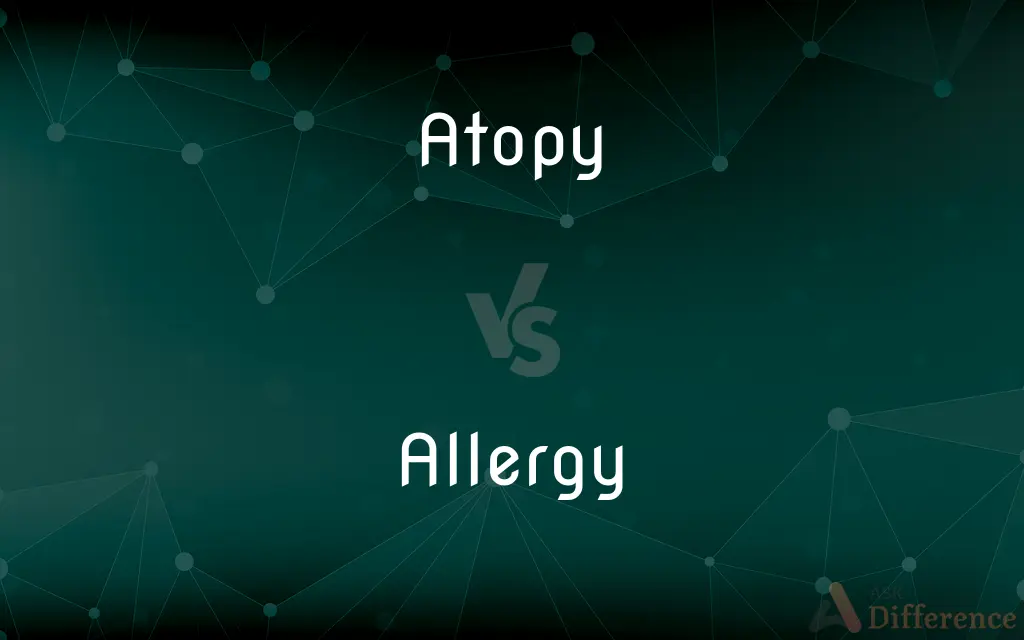Atopy vs. Allergy — What's the Difference?
Edited by Tayyaba Rehman — By Fiza Rafique — Updated on March 28, 2024
Atopy refers to the genetic tendency to develop allergic diseases, while allergy is an immune response to a foreign substance.

Difference Between Atopy and Allergy
Table of Contents
ADVERTISEMENT
Key Differences
Atopy is a condition characterized by a genetic predisposition to develop certain allergic hypersensitivity reactions. Individuals with atopy are more likely to develop diseases such as asthma, eczema (atopic dermatitis), and allergic rhinitis (hay fever). On the other hand, an allergy is a broad term that describes the immune system's reaction to substances (allergens) that are usually harmless to most people, such as pollen, pet dander, or certain foods. Allergies can affect anyone, not just atopic individuals.
While atopy specifically implies a hereditary component, making individuals more susceptible to developing allergic conditions, allergies can be acquired by anyone under the right environmental conditions and exposures. For example, a person with atopy might be genetically inclined to develop hay fever, whereas someone without atopic predisposition can still develop an allergy to bee stings or peanuts due to environmental factors.
Atopic conditions often manifest early in life, suggesting a strong genetic influence. The symptoms and reactions are part of the body's exaggerated immune response to environmental allergens. In contrast, allergic reactions can vary widely in type and severity, from mild symptoms like sneezing and itching to severe, life-threatening reactions such as anaphylaxis. This demonstrates the broad nature of allergies, encompassing reactions not necessarily linked to a genetic predisposition.
Management strategies for atopy and allergies may overlap but are fundamentally tailored to each individual's specific triggers and symptoms. For atopic conditions, managing environmental factors and avoiding known allergens are crucial steps, alongside treatments that may include medications like antihistamines, corticosteroids, or immunotherapy. Allergy treatment also involves avoidance of triggers, but for non-atopic allergies, the focus might be more on acute management of symptoms or desensitization therapies.
In summary, atopy represents a genetic tendency to develop allergic diseases and is often associated with a set of characteristic conditions. Allergies, whether occurring in atopic or non-atopic individuals, are immune responses to specific allergens. Understanding the distinction between atopy and allergy is essential for diagnosis, management, and treatment of allergic conditions and for recognizing the potential hereditary aspects of atopic diseases.
ADVERTISEMENT
Comparison Chart
Definition
Genetic predisposition to develop allergic diseases.
Immune response to a substance that is not harmful to most people.
Conditions
Asthma, eczema, allergic rhinitis.
Range from hay fever to food allergies.
Cause
Genetic.
Environmental factors, exposure to allergens.
Manifestation
Often early in life.
Can develop at any age.
Management
Avoidance of triggers, medications, potentially immunotherapy.
Avoidance of allergens, medications, emergency treatments like epinephrine.
Compare with Definitions
Atopy
Genetic predisposition to allergies.
Atopy can lead to conditions like eczema in predisposed individuals.
Allergy
Immune system's response to allergens.
Allergy symptoms occur when exposed to specific substances like pollen.
Atopy
Inherited tendency.
Atopy often runs in families, passing from parents to children.
Allergy
Symptoms vary widely.
Allergic reactions can range from mild (sneezing, itching) to severe (anaphylaxis).
Atopy
Associated with higher IgE levels.
Atopic individuals typically have elevated IgE, indicating a predisposition to allergic reactions.
Allergy
Triggered by external substances.
Food allergies are reactions to certain ingredients the body mistakenly identifies as harmful.
Atopy
Can lead to multiple allergic conditions.
People with atopy may develop asthma, allergic rhinitis, and eczema.
Allergy
Can develop in anyone.
Allergies can appear in any individual, regardless of atopic background.
Atopy
Not a guarantee of developing allergies.
Not everyone with atopy will necessarily experience allergic reactions.
Allergy
Management focuses on avoidance and treatment.
Managing allergies often involves avoiding known allergens and using antihistamines.
Atopy
Atopy is the tendency to produce an exaggerated immunoglobulin E (IgE) immune response to otherwise harmless substances in the environment. Allergic diseases are clinical manifestations of such inappropriate, atopic responses.Atopy may have a hereditary component, although contact with the allergen or irritant must occur before the hypersensitivity reaction can develop (characteristically after re-exposure).
Allergy
Allergies, also known as allergic diseases, are a number of conditions caused by hypersensitivity of the immune system to typically harmless substances in the environment. These diseases include hay fever, food allergies, atopic dermatitis, allergic asthma, and anaphylaxis.
Atopy
Of, relating to, or caused by a hereditary predisposition to developing allergic reactions, such as hay fever, asthma, or urticaria, after exposure to specific antigens such as pollen, food, and insect venoms.
Allergy
A condition in which exposure to a substance, such as pollen, latex, animal dander, or a particular food or drug, causes an overreaction by the immune system that results in symptoms such as sneezing, itching, rash, and difficulty breathing or swallowing.
Atopy
(medicine) A hereditary disorder marked by the tendency to develop localized immediate hypersensitivity reactions to allergens such as pollen, food etc and is manifested by hay fever, asthma, or similar allergic conditions; generally considered to be caused by the interaction of environmental and genetic factors.
Allergy
(Informal) An adverse sentiment; antipathy
An allergy to cocktail parties.
Atopy
A person suffering from atopic syndrome; a case of atopy.
Allergy
A disorder of the immune system causing adverse reactions to substances (allergens) not harmful to most and marked by the body's production of histamines and associated with atopy, anaphylaxis, and asthma.
Atopy
An allergic reaction that becomes apparent in a sensitized person only minutes after contact
Allergy
(pathology) Any condition of hypersensitivity to a substance.
Allergy
Altered susceptibility to a first treatment as exhibited in reaction to a subsequent one.
Allergy
(informal) An antipathy, as toward a person or activity.
He has an allergy to reality TV.
Allergy
Hypersensitivity to a particular substance.
Allergy
Hypersensitivity reaction to a particular allergen; symptoms can vary greatly in intensity
Common Curiosities
What is atopy?
Atopy is a genetic disposition towards developing allergic diseases such as asthma, eczema, and hay fever.
How does an allergy differ from atopy?
An allergy is an immune response to specific allergens, whereas atopy is the inherited potential to develop such allergic reactions.
Is atopy curable?
Atopy itself is not curable as it is a genetic trait, but the allergic conditions it predisposes individuals to can often be managed with treatment.
What are common signs of atopy?
Common signs include a family history of allergic diseases, elevated IgE levels, and the development of conditions like eczema.
Are all atopic individuals allergic?
Not necessarily; atopic individuals have a higher predisposition to develop allergies, but not all will manifest allergic reactions.
Can you have allergies without being atopic?
Yes, it's possible to have allergies without atopy, as allergies can arise from a combination of genetic and environmental factors.
What treatments are available for allergies?
Treatments include avoidance of allergens, medications like antihistamines and corticosteroids, immunotherapy, and emergency epinephrine for severe reactions.
What preventive measures can atopic individuals take?
Atopic individuals can benefit from early allergen identification, reducing exposure to known triggers, and using suitable skincare to prevent eczema.
Is it important to differentiate between atopy and allergies in medical treatment?
Yes, understanding whether an individual's condition is due to atopy can influence prevention and management strategies for allergies.
Can allergies be outgrown?
Some childhood allergies, particularly certain food allergies, can be outgrown, while others may persist into adulthood.
What role do environmental factors play in allergies?
Environmental factors such as exposure to allergens, pollution, and dietary changes can trigger allergies in susceptible individuals.
Can lifestyle changes help manage atopy or allergies?
Yes, avoiding known allergens, maintaining a healthy diet, and reducing stress can help manage both atopy and allergies.
How do genetics influence atopy and allergies?
Genetics play a crucial role in atopy by predisposing individuals to allergic diseases, while the development of specific allergies is influenced by both genetic and environmental factors.
How does atopy affect daily life?
Atopy can increase the risk of developing allergic diseases, impacting daily activities and requiring management to reduce symptoms and exposure to allergens.
Share Your Discovery

Previous Comparison
Trade vs. Swap
Next Comparison
Attractiveness vs. EngagingAuthor Spotlight
Written by
Fiza RafiqueFiza Rafique is a skilled content writer at AskDifference.com, where she meticulously refines and enhances written pieces. Drawing from her vast editorial expertise, Fiza ensures clarity, accuracy, and precision in every article. Passionate about language, she continually seeks to elevate the quality of content for readers worldwide.
Edited by
Tayyaba RehmanTayyaba Rehman is a distinguished writer, currently serving as a primary contributor to askdifference.com. As a researcher in semantics and etymology, Tayyaba's passion for the complexity of languages and their distinctions has found a perfect home on the platform. Tayyaba delves into the intricacies of language, distinguishing between commonly confused words and phrases, thereby providing clarity for readers worldwide.














































